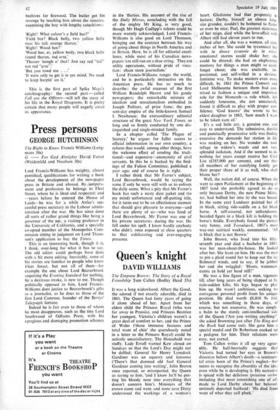Press persons
GEORGE HUTCHINSON
The Right to Know Francis Williams (Long- mans 50s) G — For God Altnighty David Farrer (Weidenfeld and Nicolson 30s) Lord Francis-Williams has weighty, almost pontifical, qualifications for writing a book about the development of the newspaper press in Britain and abroad. By ,,tempera- ment and profession he belongs to Fleet Street, where he is liked and respected; and —years before he entered the House of Lords—he was for a while Attlee's suc- cessful press secretary in the Labour admin- istration after the war. He has since done all sorts of rather grand things like being a governor of the BBC, a visiting professor in the University of California, and a specially co-opted member of the Monopolies Com- mission sitting in judgment on Lord Thom- son's application to buy the Times.
This is an interesting book, though it is, I think, over-long for what it has to say. The old editor could perhaps have done with a bit more editing. Inevitably, some of his stories are familiar to people who know Fleet Street, but not all of them—for example the one about Lord Beaverbrook acquiring the Evening Standard for nothing, by a dextrous stroke, is new to me. Though politically opposed to him, Lord Francis- Williams does justice to Beaverbrook's gifts as a journalist, as he does to those of the first Lord Camrose, founder of the Berrys' Telegraph fortune.
Indeed he is fair even to those of whom he most disapproves, such as the tiny Lord Southwood of Odhams Press, with his egregious and damaging promotion schemes
in the 'thirties. His account of the rise of the Daily Mirror, concluding with the fall of the mighty Mr King, is very good, though Mr Hugh Cudlipp's talents could be more warmly acknowledged. Lord Francis- Williams is also good on Lord Thomson, bringing out the contrast between his way of going about things in North America and in Britain. Here, be is all for editorial excel- lence, while most of his Canadian news- papers 'are still run on a shoe string. They are utility operations, without pride of voca- tion: chain store journalism.'
Lord Francis-Williams ranges the world, and he is particularly instructive on the American press. He has so much to describe: the awful excesses of the first William Randolph Hearst and his gaudy newspapers; the remarkable mixture of idealism and sensationalism embodied in Joseph Pulitzer, of prize fame; the pre- sent-day empire of the little-known Samuel I. Newhouse; the extraordinary editorial structure of the great New York Times, so long and so firmly conducted by one dis- tinguished and single-minded family.
In a chapter called 'The Plague of Secrecy,' he argues for fuller access to official information in our own country, a reform that would, among other things, have the welcome effect of eroding the tradi- tional—and expensive—anonymity of civil servants. In this he is backed by the find- ings of the Fulton Committee, published a year ago; and of course he is right.
I rather think that Mr Farrer's subject, Lord Beaverbrook, would be saying the same if only he were still with us to enliven the daily scene. What a pity that Mr Farrer's book has such a nasty dust jacket and (to my mind) unfortunate and off-putting title, for it turns out to be an affectionate memoir that should give pleasure to everyone—and there are plenty of us—who was fond of Lord Beaverbrook. Mr Farrer was one of his private secretaries during the war. He fell under his spell. I know hardly anybody who didn't, once exposed at close quarters to that exhilarating and ever-engaging presence.


































 Previous page
Previous page